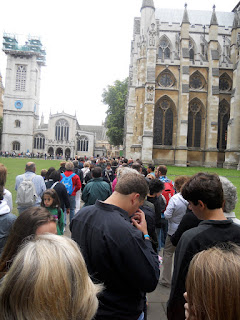“Aha! These snakes come in pairs!”
Thanks for that information Corporal. Thank a lot. I feel really good right now.
As the crowd is still around I dared to venture to my room to make sure there weren’t any snakes in there. As I open my door I see a thin black line at the edge of my door frame and I scream. John comes over to look at it’s just a belt strap. Whew! I didn’t really think there would be a snake in my room but I think I needed to scream just to release some adrenalin.
The crowd finally started to thin but the snake was still not dead. It was slithering around in one spot and opening and closing its mouth. Ugh! Not a pretty site.
Since we couldn’t leave the snake on the doorstep of the kitchen to die a long, painful and smelly death we started brainstorming what to do. John suggests we place it in the 3 stone open fire stove in the hopes of scaring the cooks into using the rocket stoves. I’ve been fighting a long battle with the cooks, John and Senator, to use the rocket stove over the open fire since it saves significantly on firewood. This idea was tempting and it would take advantage of their superstitions for the greater good of the environment but I couldn’t do that to poor old John and Senator. Plus I might end up contaminating the food with the poison from the snake. So that was not an option. Godfrey, a member of staff, then suggested we burn the snake. Apparently if there is such a large, poisonous snake in one’s surroundings you must burn it to kill it, destroy the poison and ward off any more snakes looking for an adventure. Just great…I’m going to have to burn a half-dead (more like half –alive) snake. As I’m contemplating having to light fire to this snake (I guess they thought I should do it since I spotted it first) questions such as ‘Why am I in the most rural fellowship in Africa?” “Why am I in Africa”, and “ Why did I choose to make no money and put myself in a situation to have to burn a snake?” kept popping into my head. As we were debating the logistics of burning the snake Godfrey got a long stick from the pile of firewood on the other side of the guest house and began to stab the head of the snake to put a final end to it. I couldn’t watch. It looked too sad and painful. The snake took its final breath and slithered no longer. As much as I felt relieved I was sad that we had to kill it. I wish it had just kept to itself and stayed away so it didn’t have to end up dead.
Part II
So after the snake incident the volunteers asked that I notify management so that if there is ever an incident with a snake, we’re prepared. This simply meant blocking the gaps between the doors and the floor so the snakes can’t enter the buildings and having a protocol in place with the health clinic so that if someone is bitten, we know what to do. It seems like I’m the only one though who is taking this incident seriously though since my requests for help with this have simply been shrugged off as not really that important. Having had enough of it I decided to talk to Sr. Mary (the director) about it when next she visited. With pictures of the snake in hand I approached her after lunch a couple days later. Showing her the pictures of the 1.5 METER LONG cobra snake on the doorstep, to my surprise she responds, “oh, that little thing?”. Uhhh…that little thing can kill you Sr. Mary. Unconcerned by this fact she begins reminiscing of her life in Kenya and that she’s never had any incidents with snakes in over 30 years. Hoping to get her help I try to bring her back to the issue of the cobra.
“You know what you should do Amanda. You should cut a strip out of an old tire and put it in the gap between your door and the floor.”
Apparently it was totally wrong to think that I should get help from the staff. This is obviously something I need to take care of myself. And of course we have lots of unused tires in the village (NOT) I can just cut up and snake-proof every door in the guest house . The issue on getting medical help if someone is bitten by a snake is yet to be addressed. It’s unclear if there’s anti-venom serum in the health clinic and given that we have no refrigeration I would guess that’s a negative. Being 2 hours away from a real hospital doesn’t make me feel any better about it.
So here’s my solution: Every night I place my tool bag in front of my door which blocks the gap so snakes can’t get in. I’m also looking for a book on snakes to learn how to deal with them in case another one comes around, which is pretty likely given this snake is one of about five I’ve seen so far. If anyone has any useful suggestions on what to do if you run into a snake please let me know!





















































